Raising a Bunny: Essential Care Guide for Owners
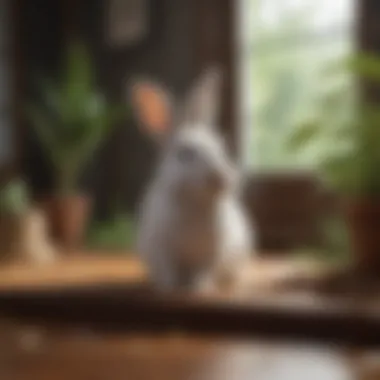
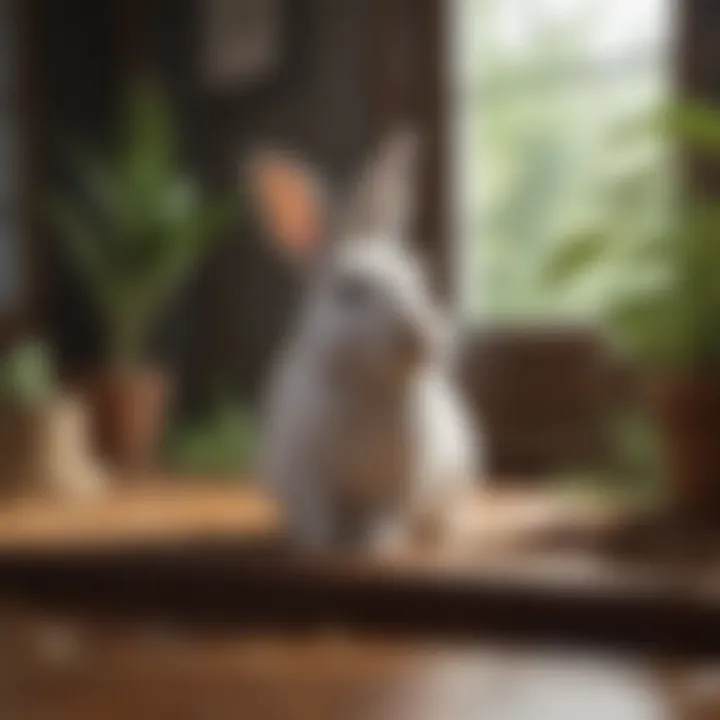
Intro
Raising a bunny requires a commitment to their overall well-being, and understanding their complex needs makes the journey rewarding. This comprehensive guide investigates the essentials of bunny care, from breed selection to dietary requirements to housing setups. Ultimately, knowing how to support your bunny means forging a bond based on trust and understanding.
Care Tips
Daily Care Routines
Having a firm daily care routine is crucial when raising rabbits. These routines cover aspects like feeding, grooming, and social interaction. Bunnies thrive on consistency, and thus creating a schedule helps make them feel secure. Begin each day with a fresh supply of hay to encourage proper digestion. Fresh vegetables should be provided as complementary to a rabbit's diet.
Bunnies also need regular grooming, especially long-haired breeds. Brush their fur frequently to minimize matting and reduce shedding. Observe your bunny during this time, as it also aids in building trust.
Cage Setup and Maintenance
A bunny's cage sets the groundwork for their living experience. Ensure the cage is specifically built for rabbits, offering ample space to move around. The right size typically allows room for food and water dishes as well as designated areas for sleeping and bathroom use. Consider using a litter box inside the cage, making clean-up easier.
Regular maintenance is essential, including changing bedding frequently and checking for any neglected areas of dirt or mess. Providing a clean space leads to a happier bunny. Unpunctuated sanitary conditions may cause health issues or stress for them.
Hygiene and Cleaning Practices
Maintaining hygiene is among the cornerstones of good bunny care. Setting up a specific cleaning schedule can prove invaluable. Daily inspections of the litter box and waste reduction minimize odor and promotes a healthy environment. Use safe, rabbit-friendly cleaners to avoid causing harm.
Weekly deep cleaning of the entire cage is recommend; remove everything, wash the primary housing surfaces, and give them time to dry before returning bedding and your bunny.
Seasonal Care Adjustments
Different seasons bring unique challenges for bunny care. In the summer, bunnies can be susceptible to overheating. Move their habitat to a cooler location while ensuring they have access to fresh water at all times. Alternatively, during the winter months, protect their habitat from cold drafts. Heating pads can provide extra warmth, but ensure that your bun can also choose to cool off if needed.
Behavioral Insights
Understanding Bunny Body Language
Recognizing a rabbit's body language is fundamental. They may communicate happiness by thumping their feet or jumping in place. For example, when in a relaxed state, a bunny may fl flop down, signaling contentment.
Mindfulness of their body cues saves misunderstandings. If a bunny appears tense or aggressive, respect their space to prevent stress or incidents.
Common Behavioral Issues and Solutions
Some bunnies develop problematic behaviors rooted in anxiety or boredom. Signs of distress go from excessive chewing on furniture to inappropriate urination. Identify root causes as a means of correcting these behaviors. Provide enrichment items, like various toys made bunnies chew on safely.
A proper understanding of what's natural helps create a supportive environment for your pet. Reinforce positive activities rather than simply discarding negatives.
Positive Reinforcement Techniques
Adopting positive reinforcement techniques fosters a trusting relationship with your bunny. Treats cannot hurt, as long as they are appropriate for rabbit diets. Offering rewards promotes desired behavior and learning.
Social Interaction Needs
Bunnies enjoy connections, both with their humans and other rabbits. Daily playtime is essential for their mental stimulation. Allowing your bunny time outside their cage space builds social skills. For those considering two rabbits, ensure they are familiar with each other. Take steps to integrate them correctly, so they have a chance to adjust.
Nutrition Guides
Essential Diet Components
Understanding a bunny's dietary needs remains a crucial part of responsible care. Their primary food should revolve around high-quality hay such as timothy hay. Grass-based pellets may act as secondary offerings in reasonable amounts.
Safe and Toxic Foods
Know what foods are beneficial for your bunny and which are harmful. Veggies such as kale, parsley, and green leafy items often stimulate encouragingly. However, avoid giving them certain items like iceberg lettuce, chocolate, onion, and garlic; such items have detrimental effects.
Supplements and Treats
In general, rabbits do well obtaining all necessary nutrition from their main diet. Most exceptions may arise under specific circumstances, like a second opinion from a veterinarian. When looking into treats, redemption quantities need considered to avoid health implications.
Feeding Strategies for Different Breeds
Different breeds require attention to detail based on size and specific needs. A larger breed bunny typically requires higher hay quantities compared to smaller counterparts. Observation regarding the bunny's appetite changes will always prove essential in feeding strategies.
Wellness and Health
Routine Health Checkups
Routine checkups will likely prevent major health issues besides encouraging familiarity with a vet. Specific breeds may have distinct predispositions toward certain conditions. Regular vet visits ensure the longevity of your rabbit's life.
Identifying Symptoms of Illness
Having a watchful eye proves necessary so you can identify signs like lethargy, changes in poop shape or quantity, and reduced appetites. Catching symptoms earlier leads to better treatment options alongside chances for recovery.
Preventative Care and Vaccinations
Vaccinations can protect against several illnesses. Consult veterinarians for specific recommendations suitable for bunny types.
Mental and Emotional Well-being
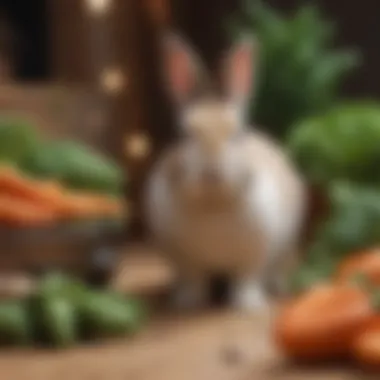
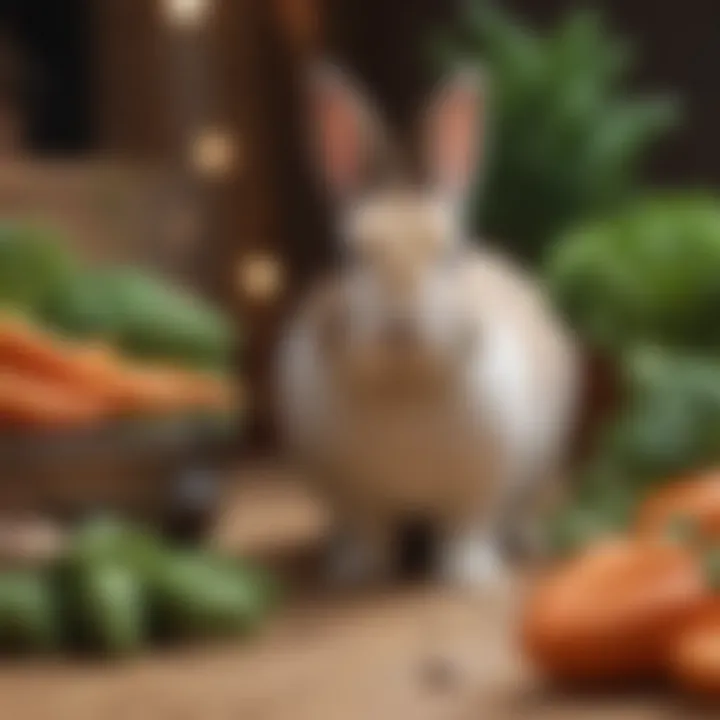
Veterinary care does address physical needs; mental well-being is equally important. Be accepting of the time a dog needs feeling secure and bonded to you. Various cuddly spots may also aid them to relax and renew.
Enriching Activities
Toys and Playtime Ideas
Playtime directly influences a rabbit's happiness. Providing safe, rabbit-approved toys encourages creative exploration. Look for wooden toys or stuffing-free options that they can push around on their own.
Training and Tricks
Emphasizing positive engagement fosters both confidence and cooperative behavior. Training plays an enormous role in enriching the rabbit experience and integrating challenges that require physical or mental involvement helps with this aspect.
Outdoor Activities and Interaction
If adequately supervised, engaging in outdoor activities offers mental stimulation for bunnies. Exploratory time motivates further growth by maintaining a safe and tempting environment, or preventing hazards that could induce injury.
DIY Projects for Mental Stimulation
Consider creating simple DIY solutions utilizing cardboard tubes, small boxes, or household items. These inspire bunnies to learn problem-solving journey and keep boredom at bay, facilitating inner creativity.
Establishing a routine, offering enrichment, and monitoring health leads to a fulfilling experience for rabbit owners and their furry companions alike.
Foreword to Bunny Care
Bunny care is an essential part of owning a pet rabbit. It involves understanding their specific needs, ensuring a healthy and secure environment, and committing to their well-being. Many people see bunnies as adorable, fluffy companions, but they are also living beings that require attention, love, and resources. Knowing about bunny care is crucial for the longevity and happiness of these animals.
Caring for a bunny comes with its unique challenges and rewards. Owners must recognize both the time and financial commitment necessary to keep their pets healthy. Bunnies can live up to ten years or more, depending on their breed and care. Therefore, potential owners should evaluate their lifestyles, capabilities, and readiness to adopt a bunny, which is a long-term responsibility. The beginning stages of bunny care lay a foundation for a nurturing relationship between the owner and pet.
Understanding the Commitment
Bunny ownership requires significant devotion. First and foremost, understand that a bunny is a long-term commitment. They are not short-lived pets like some when they wander briefly in and out of someone's life. Factors like regular health check-ups at the vet, daily feeding schedules, and mental stimulation through play and bonding time can keep them thriving.
To maintain a bunny’s well-being, owners hugely responsible for their emotional and physical issues. Unlike cats or dogs, bunnies have specific dietary requirements and unique housing needs. Moreover, understanding the social aspects of bunny living is critical. Bunnies are social creatures. They benefit from interaction with humans and potentially other bunnies. Therefore, multiple hours focused on them each week are suggested.
Taking care of a bunny also often involves reflecting on one’s own living arrangement and making necessary adjustments for wooden chew toys or ample running space. Potential pet owners also need to evaluate their financial capacity for veterinary visits or quality dietary needs including hay.
Bunny Ownership Trends
The rabbit ownership trend is growing as people increasingly recognize them as delightful pets. Over recent years, statistics show that many homes have less maintenance pets. As a result, demand for bunnies has surged, with many individuals actively researching what it means to care for a bunny before they adopt. Websites like Reddit or community groups on Facebook offer valuable resources for tips and advice in bunny ownership.
People appreciate the gentle demeanor of rabbits, unlike some dog breeds that are more hyperactive. Individuals often cite them as calm, cuddly companions with the right focus.
The rise of rabbit rescue facilities owes much to raised awareness on ethical treatment of animals. People frequently adopt over purchasing from pet stores, contributing to decreased rabbit population rates in institutions. With many bunnies in shelters needing homes, the increase in adoption highlights not just the practical, but moral aspects related to responsible animal ownership.
As this trend continues, further educational resources and community support for new owners can be pivotal. More reliance on informed practices leads to healthier bunnies, which benefits the overall perception of these pets in households.
Being successful in raising a bunny is not by accident but through several well-informed steps. When potential pet owners learn what the journey involves, they strengthen the framework for a happier pet-ownership experience.
Selecting the Right Breed
Choosing the right breed is crucial for successful bunny ownership. Each breed has distinct characteristics, varying sizes, and personalities. Therefore, it is important to learn about different actions of breeds before adoption or purchase. It can greatly influence your experience as an owner. Some may require more attention or have unique health needs. Understanding these traits will help you find the perfect match for your home and lifestyle.
Popular Bunny Breeds
There are numerous breeds of rabbits, each boasting unique qualities. Understanding popular options helps you in making easier decisions. Some renowned breeds include:
- Holland Lop: Small in size, affectionate, and loves attention.
- Mini Rex: Known for their soft fur and laid-back demeanor, they bond well and enjoy interaction.
- Netherland Dwarf: Very small, social, and filled with energy, generally known for a playful attitude.
- English Angora: Fluffy with extra grooming needs, they require commitment and regular care.
- Lionhead: Characteristic of a mane-like fur, sociable the energetic.
Each breed also has its range when it comes to health conditions susceptible by breed, so it bulk up thus educating yours-self.
Assessing Your Lifestyle Needs
Take your personal lifestyle into account when changing a bunny. Questions to consider:
- Space: Did you live in a small apartment or a house with a garden?
- Allergies: Does anyone have hay or fur allergies?
- Time: Are you willing to provide daily attention? Bunnies need bonding, just like cats and dogs.
- Children: If kids are enter ya family, ensure they would be gentle with the bunny.
Once have determined these factors, you can zero in on which breed fits and aligns with your situation, leading to a satisfying partnership.
Adopting vs.
Purchasing
Both paths present their benefits but also their unique challenges.
Adopting is generally recommended, as shelters often hold rabbits needing a home. Here is why it makes good sense:
- Saving a Life: Many bunnies sit in shelters hoping for a family.
- Cost-effective: Adoption fees typically cover initial vaccinations and spaying or neutering.
- Known History: Shelters often offer information about the bunny’s past behavior or health.
On the other hand, purchasing from a breeder may be beneficial if you looking for specific breed characteristics. Here’s some note:
- Health Guarantees: A reliable breeder usually imposed health guarantees.
- Availability: Better chances of finding a specific breed you desire.
- Genetic Understanding: Good breeders can elaborate on lineage traits.
Evaluate these option methodically. It might help to streamline your choice, regarding what is the best_option for you and darnement your own bunny.


Creating a Suitable Living Environment
Creating an optimal living environment for your bunny is vital for their overall health and happiness. It goes beyond mere aesthetics; it defines their day-to-day quality of life. A suitable environment allows bunnies to thrive, explore, and engage naturally. Proper housing offers sufficient space, security, and the ability to express their instinctive behaviors like jumping, digging, and resting. Understanding your bunny’s specific needs can enhance not only their contentment but also the bond shared between pet and owner.
Indoor vs.
Outdoor Housing
When debating between an indoor or outdoor housing scenario for your bunny, several factors appear. Indoor housing provides a controlled environment and minimizes exposure to predatory animals. This option tends to foster quikcer bonding as bunnies live more closely with families. Similarly, indoor living offers dogs secure supervision, thus reducing the chance for accidents.
On the other hand, outdoor settings can provide a richer exploratory experience, especially in a secure, modified enclosure. Bunnies relish the natural textures of grass and soil. However, outdoor settings come with inherent dangers like extreme weather conditions and threats from wildlife. Ultimately, the decision should hinge on the specific reality and generated risks in the homeowner's environment.
Essential Housing Requirements
Regardless of whether your bunny lives indoors or outdoors, certain housing essentials should be met. At a minimum:
- The housing must be escape-proof. Bunnies are intelligent animals who can find their way out of improperly secured spaces.
- Ample room for movement should exist, ideally providing a square footage of at least 12 square feet for a single bunny.
- Proper ventilation must be considered. Stagnant air can lead to various respiratory illnesses.
- Soft bedding creates a comfortable resting space. Ideally, use materials that can be easily cleaned and have the ability to absorb moisture.
- Access to fresh, clean water is a must. Ensure water dishes are stable and not easily flip-able by curious paws.
Adding levels or ramps can offer enrichment and exercise in any medium space. Remember that variety often emulates natural habitat advantages in the housing structures.
Safety Measures and Hazards
Evaluating safety in your bunny's housing involves watching out for hazards both large and small. Many common dangers can lurk in homes. Always consider:
- Wires and cords. Bunnies love to chew. Exposure to this could result in unfortunate accidents.
- Toxic plants are another dangerous hazard. Keeping a checklist of harmful houseplants can prevent any life-threatening exposure.
- Ensure that all cages or enclosures are built of chew-proof materials that won't harm the bunny’s health.
- Small objects that can be swallowed or lodged in other spaces are a concern as well. Detect and remove any potential choking hazards in advance.
A regular walkthrough of your bunny's environment can identify risks and confirm the safety of your pet's home. The goal is to create a loving, safe environment for your furry companion to enjoy.
Nutritional Needs of Bunnies
Proper nutrition is fundamental in maintaining the health and well-being of a bunny. Understanding what constitutes a nutritious diet allows owners to make informed decisions that positively impact their pet's growth and longevity. This section will break down the essential components of a bunny’s diet, highlighting their importance and the considerations attached to each element. A carefully curated diet will help avoid common health issues, such as obesity and digestive problems, which are often linked to poor dietary choices.
Understanding Bunny Diet
Bunnies require a specific diet to thrive. Their digestive systems are specially engineered to process high-fiber foods. This diet should prioritize hay, fresh vegetables, and fruits in moderation. Each of these elements serves unique roles that contribute to creating a balanced nutritional regime. Moreover, owners should become aware that not all recommended foods are universally applicable; understanding your bunny’s uniqueness, such as age and health status, is key.
- Hay should be at the core of every bunny diet.
- Vegetables are essential as secondary sources of nutrition.
- Fruits may be treats but should remain limited.
A thoughtful rabbit owner considers these layers of nutritional needs to ensure a rich and varied diet.
Importance of Hay
Hay serves a vital role in a bunny’s nutrition. It is the primary source of fiber necessary for proper digestion and maintaining gut health. Long-stemmed hay aids in wearing down bunny teeth, which continuously grow throughout their life. If a bunny does not have access to suitable hay, it could likely lead to dental issues.
Timothy hay is one popular choice among owners, providing a nutritious balance. Other options include orchard grass and oat hay.
The provision of hay must be abundant, as a free supply encourages foraging behavior, which is integral to a bunny's well-being. The benefits are clear, making hay an irreplaceable part of every meal.
Fresh Vegetables and Fruits
Vegetables play an important role in diversifying a bunny's nutrition. Leafy greens such as romaine lettuce, cilantro, and kale can enrich a bunny's diet with vitamins and minerals. Introducing a variety of vegetables helps hold the bunny's interest and ensures it absorbs diverse nutrients. Owners should avoid starchy or high-sugar vegetables, which could trigger digestive problems or obesity.
Fruits should be approached with caution. Options like carrots, berries, and apples may be given, but in moderation. Treats rich in sugar can encourage unhealthy eating habits; therefore, fruits must not exceed 10% of the daily diet.Focus on introducing new items gradually to observe any potential reactions.
Commercial Pellets: Pros and Cons
Commercial pellets are a convenient source of nutrition for bunnies. They typically contain nutrients needed for a complete diet. Many brands tailor their products to ensure they meet the bunnies’ digestive needs and nutrient requirements. However, not all brands or types hold the same quality. Comparing ingredients and seeking high fiber-content pellets is crucial.
Pros
- Convenience: Easy to measure and feed.
- Availability: Accessible in pet stores and online.
- Nutrient-Rich: Can be designed to include all necessary bunny nutrients.
Cons
- Over-Recommendation Risks: Some owners might rely too much on pellets.
- Nutrient Imbalance: Pellets can lack the required roughage if they constitute the bulk of the diet.
In summary, while pellets can hold a valid place in the overall diet, they should never outcompete hay or fresh vegetables.
Aim for a balanced diet to promote lasting health and longevity in your bunny, serving hay, vegetables, and controlled fruit portions effectively.
Health and Wellness Considerations
Taking care of a bunny requires much more than just feeding and housing. The health and wellness of your pet are fundamental facets of responsible bunny ownership. Bunnies are susceptible to various health issues, so regular care is important. Understanding their specific needs can yield long-term benefits for both the bunny and the owner. Establishing routine veterinary visits can help detect underlying health issues before they escalate.
Regular Veterinary Care
Regular veterinary care is essential for maintaining the overall health of your bunny. An initial check-up shortly after bringing a new bunny home can provide you with vital insights into its health status. Many veterinarians offer diagnostic testing for common infections and health conditions in rabbits. Establishing a schedule for yearly health checks is recommended. During these visits, your vet will monitor your bunny's weight, assess dental health, and offer vaccinations as needed.
Consider also that exotic vets, who specialize in small animals like rabbits, can provide targeted care. Being connected to a veterinarian who understands bunnies is a significant advantage. It is crucial to keep track of your bunny's medical history to reference during check-ups.
Common Health Issues
Bunnies bring joy but also come with medical challenges. Some common health issues include:

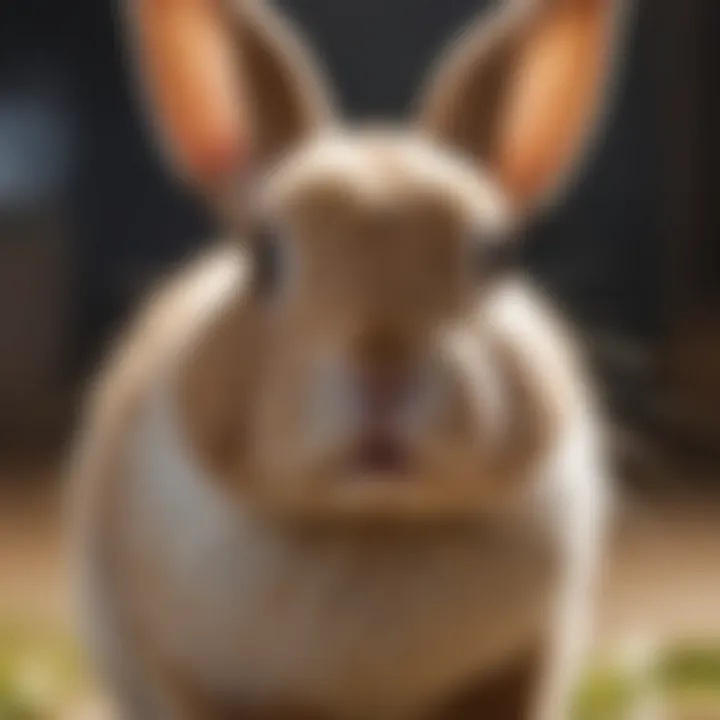
- Dental diseases: Bunnies have continuously growing teeth. Misalignment leads to unintentional impairments.
- Gastrointestinal stasis: This is a severe and often preventable condition where the digestive system slows down or shuts off.
- Respiratory infections: Bunnies have sensitive respiratory systems. Environmental factors can lead to issues.
It’s necessary to observe behavioral changes as these could signal something is wrong. Look for signs like loss of appetite or unusual lethargy. Noting these changes can prompt timely visits to your veterinarian.
Preventative Care Strategies
Taking preventative measures can significantly enhance your bunny's quality of life. Some strategies to consider include:
- Maintain a proper diet including hay, fresh veggies, and limited pellets to reduce the likelihood of health issues.
- Regular exercise is key. Providing a spacious area for your bunny to explore can lessen the chance of obesity.
- Grooming and hygiene play a critical role in health as well. Regular brushing reduces the risk of matting fur and encourages skin health.
Preventative care helps detect issues early and addresses them effectively. Proper veterinary care and keeping an eye on your bunny’s eating habits assists in provding a healthier lifestyle.
Furthermore, coordination and education about rabbit care should not be overlooked. Resources online can guide owners in health and wellness considerations for their bunnies, allowing a harmonious relationship between pet and owner.
Behavioral Insights
Understanding bunny behavior is crucial for successful bunny ownership. Many people overlook this aspect when bringing a bunny into their home, but understanding these furry friends leads to a deeper bond and creates a happier living environment. Familiarizing oneself with social behaviors and playfulness is essential to provide a harmonious atmosphere for both the bunny and the owner.
Understanding Bunny Behavior
Bunnies display unique behavioral traits that can significantly differ from other pets. For instance, they are social animals who thrive on interaction. Recognizing gestures like nose twitches, ear positioning, or jumping around in circles will help clarify your bunny's mood.
- Nose twitching may suggest curiosity or excitement.
- Flop or binky (a joyful jump) typically indicates happiness and comfort.
- Ear position can also notif either alertness or relaxation.
By observing these behaviors, one can better assess their pet's state of mind. Make it a habit to monitor comportment in various daily situations. A deeper knowledge of your bunny's behavior not only helps in building rapport but also permits the identification of specific needs or discomfort.
Socialization and Bonding Techniques
Bonding with a bunny takes time and patience, but socialization yields fruitful results. Making positive associations with your presence is fundamental. Here are some techniques:
- Consistent handling: Gently hold your bunny for short periods each day. Gradually extend the duration so they become accustomed to your touch.
- Treats: Using their favorite snacks, like small pieces of carrot or parsley, encourages positive reinforcement. Offer treats when they come near you, fostering trust and security.
- Create a playtime routine: Set aside specific times for exploration and interaction. A bunny enjoys routine, making your companionship more enjoyable.
- Respect their space: Even social beings need quiet time. Respecting their needs and allowing them to retreat promotes comfort in your presence.
Identifying Stress and Anxiety
Stress can severely affect a bunny's health and quality of life. Recognizing signs of distress is vital for ensuring emotional and physical well-being. Common indicators include:
- Hiding: If your bunny frequently dashes to a tucked space, they feel overwhelmed or scared.
- Scratching more often than before: This can indicate irritation or discomfort, perhaps from their living environment.
- Changing eating habits: Skipping meals or overeating signal emotional disturbances.
You can assist your bunny in managing anxiety by creating a secure environment. Utilizing noise barriers, gentle handling, and spending quiet time together helps alleviate stress. Allowing enough space for exploration without pressure ensures higher confidence.
Understanding the needs of your bunny and addressing emotional states make for a well-adjusted pet. Their happiness ultimately relates to your attentiveness.
Creating Enrichment and Activity Plans
Creating suitable enrichment and activity plans for your bunny is vital. Bunnies are active creatures that thrive on interaction and stimulation. This aspect of bunny care is often overlooked but plays a crucial role in their overall well-being. Enrichment activities encourage natural behaviors, keep bunnies physically fit, and aid their mental health. For example, providing varied activities helps counteract boredom, which can lead to misbehavior or depression.
Physical Space for Play
Bunnies need adequate physical space to express their natural behaviors. Ensuring a spacious and safe environment allows bunnies to hop, stretch, and explore. While you might feel tempted to keep them in small areas, this is not beneficial. Bunnies require a room or a designated space that can suit their energetic nature. Build this space in a place where they can dig, jump, and use their natural instincts.
Make sure the area does not contain harmful objects or poisonous plants. You can use tunnels made from cardboard or encourage climbing by offering low, sturdy platforms. Ultimately, the key is to create a space where they can freely engage in activities.
Mental Stimulation Strategies
Mental stimulation is equally crucial for bunnies. Intelligent pets that require challenge in their daily lives to stay content. Consider implementing puzzles or food-dispensing toys. These items compel your bunny to think and engage with the environment. Another simple way to boost their mental engagement is by changing the layout of their living space regularly. Mix up their tunnels and obstacles, which keeps their curiosity piqued.
You can also teach a few simple commands using clicker training. It not only prepares your bunny but will enhance bonding between both of you. Given consistent effort, you can observe when your bunny tackles challenges with determination.
Creating an environment with both physical and mental engagement can significantly improve a bunny's happiness and lifespan.
Safe Toys and Interactions
Toys play a critical role when raising a bunny. Choose toys that are safe, durable, delectable. Options such as untreated wood blocks and sisal balls appeal to bunnies. Avoid toys with small parts that they might swallow. If your bunny loves chewing, try leafy or fibrous toys, which can help with dental health as well.
Social interactions with both people and other pets also shape their behavior positively. Schedule daily playtime to keep your bunny accustomed to touch and play, as these experiences sweeten their personalities. Monitor behavior during clowning around, any signs of distress must be taken seriously. Enriching their interaction diversifies their experiences and makes life more enjoyable for your pet bunny.
In summary, planning and creating an environment and engaging activities are necessities. Being a responsible bunny owner means providing care that includes mental and physical enrichment. Those small actions lead to long, healthy lives for bunnies.
Closure
Raising a bunny requires deep understanding of its needs. The concluding thoughts focus on the essental responsibilities that come with being a bunny owner. Each aspect discussed in this article is significant.
Reflecting on the Responsibilities
Owning a bunny is not just about providing food and shelter. It involves consistent care that influences their health and happiness. Bunnies are social animals requiring regular interaction. This can foster strong bonds between owner and pet. Neglect in any form, be it physical or emotional, can lead to distress for the bunnies. Intending owners must be ready to invest time and resources. A well-informed approach conclusively leads to better care.
Certain responsibilities include:
- Regular vet visits: Necessary for preventative care.
- Diet management: To maintain their health.
- Environmental enrichment: Helps prevent boredom and stimulates mind.
By addressing each of these essentials, owners confirm their commitment to good care.
“Successful bunny ownership is a long-term commitment requiring dedication and understanding. It informs the overall wellbeing of bunnies in their households.”
Future Considerations for Bunny Owners
As one thinks ahead, the journey of bunny ownership should maintain flexibility. Situations may arise requiring adjustments. It helps new and current owners consider future housing options. Can the living space evolve?
Here are some considerations:
- Changes in lifestyle: Traveling might affect care.
- Health of your bunny: Conditions require adaptation.
- Potential for bonding: Interactive experiences influence pet growth.
Bunny owners should seek resources constantly. Engage with community engagements through platforms such as Reddit and connect with specialized groups on Facebook. Continuously evolving as informed owners ensures efficient care for our bunnies. By investing time into understanding future needs, owners can facilitate a fulfilling life for their rabbits.















